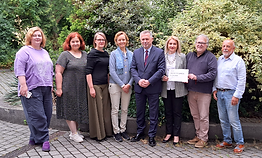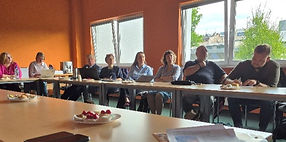SFSC4FOODSEC
Organisational and IT-supported models for growing local food markets for food security in the Baltic Sea Region and Ukraine
(Modele organizacyjne i cyfrowe dla rozwoju lokalnych rynków żywności dla bezpieczeństwa żywnościowego w regionie Bałtyckim oraz Ukrainie)

The SFSC4FoodSec project is a transnational initiative led by the Swedish University of Agricultural Sciences (SLU). The goal and motivation is initiate a regional approach to strengthening Short Food Supply Chains (SFSCs) as a strategic response to food security challenges, rural revitalisation, and agricultural reform across the Baltic Sea Region and Ukraine.
SFSCs are increasingly recognised for their potential to build resilient, inclusive, and sustainable food systems. Despite policy support through the EU Common Agricultural Policy (CAP) and growing public interest, SFSCs remain marginal in the marketplace. Key barriers include limited farmer knowledge, institutional constraints, logistical challenges, and low consumer awareness. The project addresses these issues by comparing and contrasting organisational models for SFSC mainstreaming in each of the participating countries, with reference to new IT opportunities.
The project builds on the Horizon Europe-funded CORENET initiative, which is developing an EU-wide advisory system for SFSCs. SFSC4FoodSec complements CORENET by focusing on the organisational and business models that enable SFSCs to grow in the diverse regulatory and political contexts of the Baltic Region and Ukraine. The motivation is to understand better how SFSC models can be adapted and scaled to increase producer-consumer transactions while reducing costs, thereby enhancing the value and impact of local food markets.
The partnership includes SLU (Sweden), IsoTech (Poland), the Civil Society Institute (Ukraine), the Latvian Rural Forum (Latvia), the Vytautas Magnus University (Lithuania). For the purposes of the project, these organisations act as brokers between grassroots SFSC practitioners and national policy-makers in their respective countries, particularly those involved in CAP Plan formulation and implementation. The project also aims to engage social impact investors and Ministries of Agriculture and Rural Development to explore potential for aligning funding and policy instruments for SFSC mainstreaming.
Key activities include:
-
A needs assessment through surveys and interviews with SFSC initiators and organisers.
-
Establishing a transnational learning and support network.
-
Hosting a regional conference in Poland during its EU Presidency in 2025
-
Developing an online Q&A platform to facilitate peer learning and stakeholder engagement.
-
Preparing a follow-up cooperation project proposal for the Swedish Institute and identifying additional funding opportunities.
Expected results include:
-
A clearer understanding of the organisational barriers and enablers for SFSC scaling.
-
Strengthened regional cooperation and knowledge exchange through networking SFSC organisers, initiators and supporters.
-
Enhanced visibility and policy support for SFSCs in CAP Plans, including Ukraine’s accession process.
-
A foundation for future transnational projects and investment in SFSC innovation.
SFSC4FoodSec seeks to initiate a decentralised, adaptive network of SFSC initiators, organisers and supporters for mutual learning and support on how to mainstream local markets for locally-produced food for improved food security in the Baltic Sea Region and Ukraine.
Krakow conversations on food security
A series of interconnected workshops, events and discussions was held in 9-11 July 2025 in Krakow as part of the SFSC4foodsecurity networking project. A multiplicity of interactions among project partners and Krakow food stakeholders generated insights on the barriers and bridges to mainstreaming short food supply chains for food security of the Krakow metropolitan area, and also in other countries of the Baltic region and Ukraine.
At the request of the Mayor of Krakow, the meetings were timed to contribute directly to working out how to include food security and sustainability priorities in updating of Krakow’s development strategy.
Conversation with the Mayor of Krakow
What’s the potential for short food supply chains linked to non-industrial agriculture in the Krakow metropolitan area for assuring food security in times of crisis? This was one of the key questions of the session held on July 10th to discuss food policy proposals in Krakow’s development plan 2030/50.
Participants included Stanisław Mazur, the 1st Deputy Mayor of Krakow; Krzysztof Gorlich who heads up the inter-departmental team at City Hall drafting the Strategy document; SFSC4foodsecurity project partners; Olena Postolnyk from the Jednosc Foundation in Krakow, which works with young people and focuses on building strong Polish-Ukrainian relations.

Conversation with Anatolyi Tkachuk
What are the lessons for boosting food security for Krakow, which should be included in the updating of Strategic Development Plan? How can citizens become more engaged in food production and distribution in and around Krakow? Why is locally-produced food so important for food security? Why is it important to sustain small-scale farming around the city?
Anatolyi Tkachuk from Ukraine’s Civil Society Institute has been at the heart of mobilising local communities and governments for food security in Ukraine. Unable to travel to Krakow due to bombardment of his region, he offered a presentation and his thoughts on seeing locally produced food as the key to resilience in the face of crisis

Conversation with SFSC4foodsec partners
Each of the project partners prepared an SFSC needs analysis from the perspective of their country. The point of departure for the review in each country was the EU definition of what constitutes an SFSC. Country review were structured around 4 questions:
-
What is the current situation with respect to SFSC?
-
What is the desired or ideal situation?
-
How to move from the current to the ideal situation?
-
Who needs to do what? When? And with what resources?
The following partners of the SFSC4Foodsec joined the conversation: Aiva Apsa Kisemice, Lisa Blix Germundsson, Rafał Serafin, Vilma Atkociuniene, Ausra Zliobaite

Conversation with Krakow food stakeholders
The workshop aimed to support conceptual work on Kraków’s food system resilience, aligned with the Milan Urban Food Policy Pact and international experiences, contributing to the Krakow Development Strategy 2030/50. The workshop brought together food system stakeholders from across the metropolitan area for the first time!
Krakow food system stakeholder attendees included representatives from Kraków City Hall, Małopolska Regional Government, Malopolska Agricultural Advisory Centre, Krakow branch of the National Agricultural Advisory Centre, Local Government of Michałowice, Jagellonian University, Institute for Food Strategy Grunt (an NGO), Malopolska Agricultural Chamber, Marchewka Mobilna Local Market, media and restaurateurs and the SFSC4Foodsec project partners.

